 Technology peripherals
Technology peripherals
 AI
AI
 David is resurrected! NVIDIA recreates 'Neural Langelo', 3D reconstructs muscle texture visible to the naked eye
David is resurrected! NVIDIA recreates 'Neural Langelo', 3D reconstructs muscle texture visible to the naked eye
David is resurrected! NVIDIA recreates 'Neural Langelo', 3D reconstructs muscle texture visible to the naked eye
Today, NVIDIA recreated Michelangelo’s “Neuralangelo” from the 16th century.
Look, Neuralangelo has "reproduced" a 3D version of the famous statue of David, with marble details and textures that are lifelike.
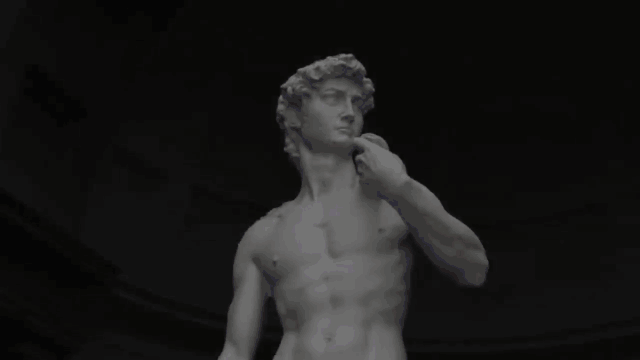
You know, the statue of David collected at the Academy of Fine Arts in Florence is only 3.96 meters tall, including the base. There are 5.5 meters.
It can even reconstruct the internal and external structure of a building, with roof tiles, glass panes, and various details reproduced one by one.

All of this is the magic of "Neuralangelo".
A new AI model proposed by researchers from NVIDIA and Johns Hopkins University uses neural networks to reconstruct 3D objects.
The latest research has been accepted by CVPR 2023.

Paper address: https://research.nvidia.com/labs/dir/neuralangelo/paper.pdf
In particular, Neuralangelo can reconstruct "high-fidelity large-scale scenes" from mobile phone videos and videos taken by drones.
Isn’t that the future, where you can easily turn videos of a city or even outer space into an immersive world, and then put it into a game to experience it?
Netizens exclaimed that NVIDIA has hacked the "Matrix" world!

Some people even claim that Apple’s XR technology, coupled with Neuralangelo, can create “new worlds” .

Effect Demonstration

Nvidia’s headquarters

##Old truck
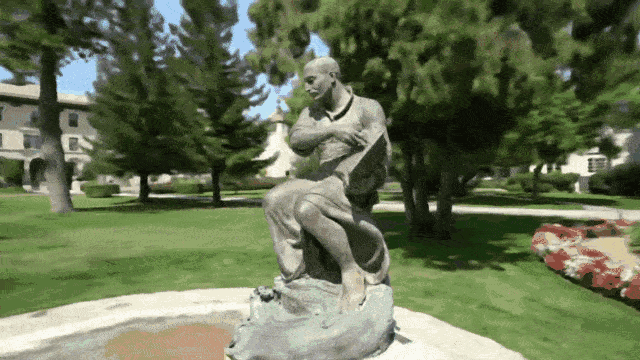
##Statue of IgnatiusReconstructed 3D scene
Previous AI models often struggled to accurately capture repetitive texture patterns, uniform colors, and strong color changes when reconstructing 3D scenes.To this end, the team proposed a new method - Neuralangelo - that combines the representation capabilities of multi-resolution 3D hash grids with neural surface rendering.
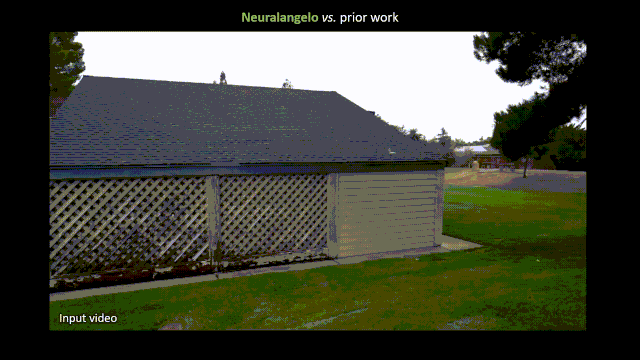
Last year, Nvidia researchers created a new tool, 3D MoMa, which makes it easy to turn photos into 3D objects.

NeuralAngelo builds on this concept, allowing the import of larger, more detailed spaces and objects. What makes it special is that it can accurately capture repeating texture patterns, homogeneous colors and strong color changes.
By using "real-time neurographic primitives", the core of NVIDIA's Instant NeRF technology, Neuralangelo can capture finer details.
The team’s approach relies on 2 key elements:
(1) Numerical gradients for computing higher-order derivatives as smoothing operations;
(2) Perform coarse-to-fine optimization on hash grids that control different levels of detail.
Even without auxiliary depth, Neuralangelo effectively recovers dense 3D surface structures from multi-view images with a fidelity that significantly exceeds previous methods, enabling the extraction of data from RGB videos. Capture and reconstruct detailed large-scale scenes.
Building NeuralAngelo
The NeuralAngelo model is built on multi-resolution hash encoding and SDF-based volume rendering.
Step 1: Use numerical gradients to calculate higher-order derivatives
It is possible to optimize beyond local cells by using numerical gradients with steps that match the spatial resolution of the hash grid. Compared with analytic gradient, numerical gradient plays a smoothing operation on SDF.

Step 2: Gradually refine the level of detail
By gradually reducing the step size of the numerical gradient and enabling a higher resolution hash grid, the optimization effect can better restore large areas of smoothness Surfaces and fine geometric details. This learning process can gradually improve the level of detail.
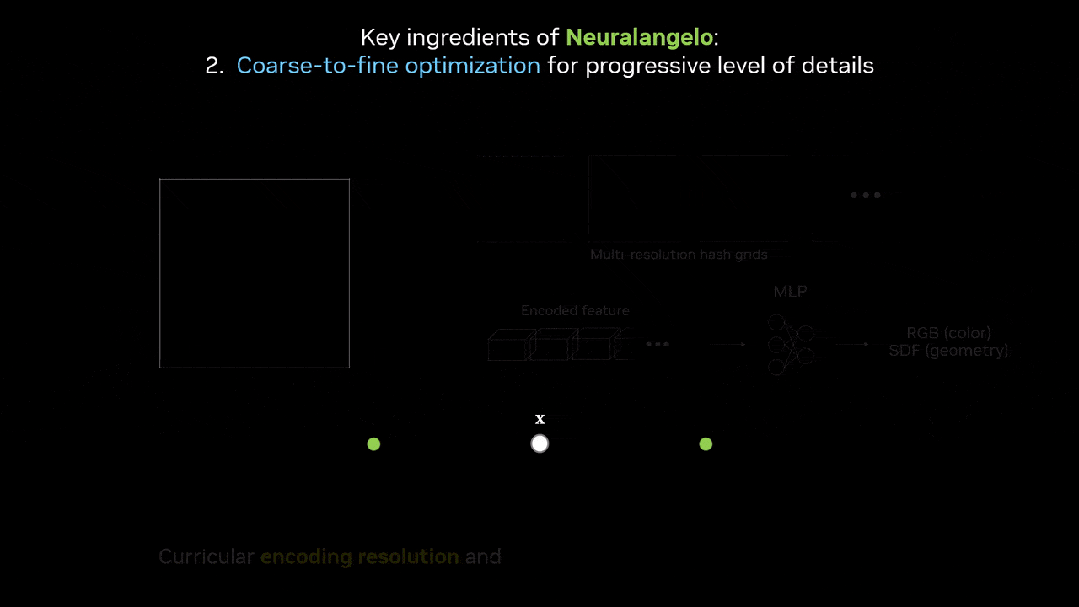
Step Three: Optimization
NeuralAngelo uses three optimization objectives:

##RGB synthesis loss
 : RGB reconstruction loss between input image and synthetic image.
: RGB reconstruction loss between input image and synthetic image.
Eikonal loss
 : Regularize the underlying SDF so that its surface normal is Unit regularity.
: Regularize the underlying SDF so that its surface normal is Unit regularity.
Curvature loss
 : Regularize the underlying SDF so that the average curvature is not arbitrary get bigger.
: Regularize the underlying SDF so that the average curvature is not arbitrary get bigger.
"Neurolangelo" is built, so how does it work?
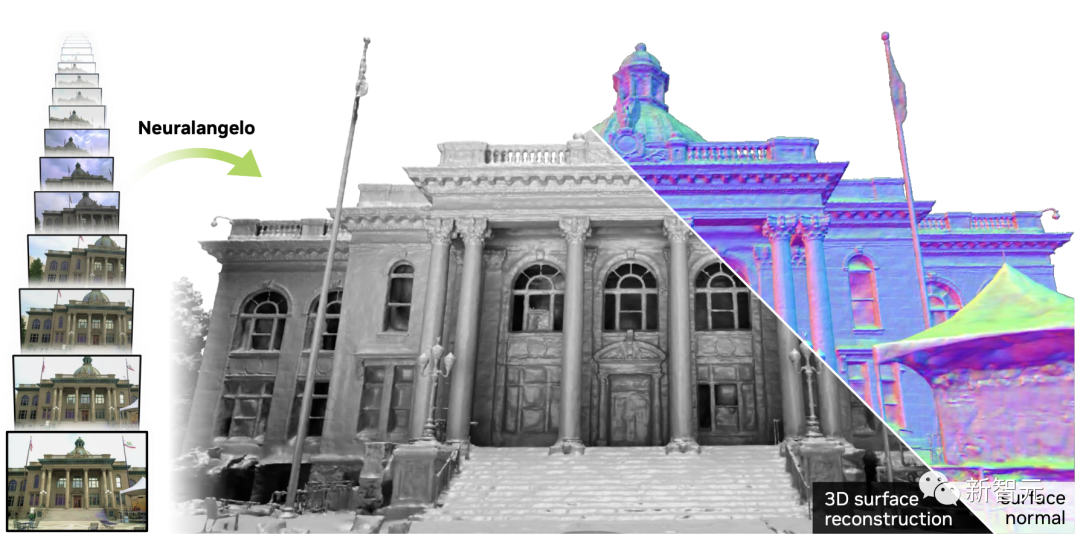
##It can be said that Neuralangelo restored the entire process of Michelangelo's portrayal of David:
· First, the model will select several frames from the 2D video of the object/scene taken from different angles, and thus "see" its depth, size and shape. The process is similar to how a sculptural artist would initially compose a composition from multiple angles.
· The model then creates a rough 3D representation of the scene, just as the artist begins chiseling the shape of the subject.
· Finally, the model is refined to render for greater clarity of detail, just as an artist meticulously embellishes the texture to mimic the texture of a fabric or human form.
In a qualitative comparison of DPU benchmarks, Neuralangelo produces more accurate and higher-fidelity surfaces.
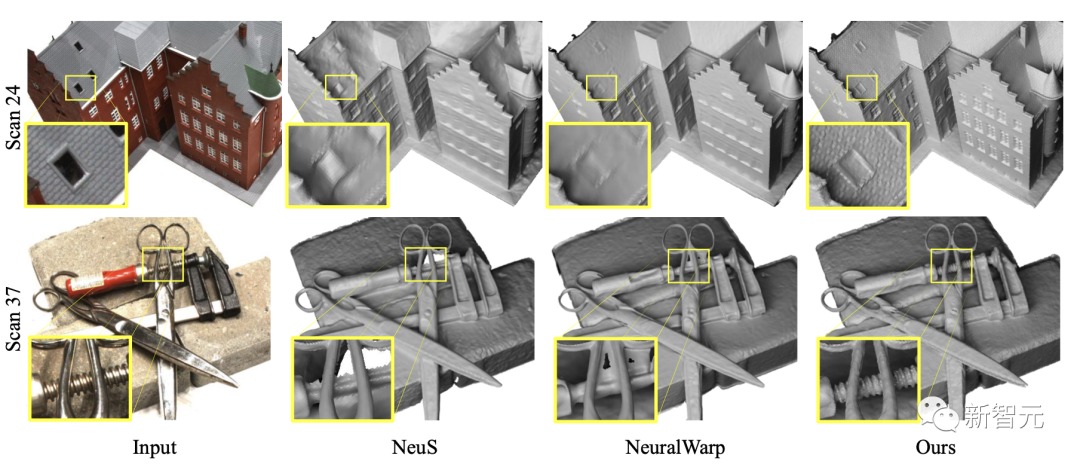
The following are the quantitative results of Neuralangelo in the DTU dataset. The model achieved good reconstruction accuracy and image synthesis quality.
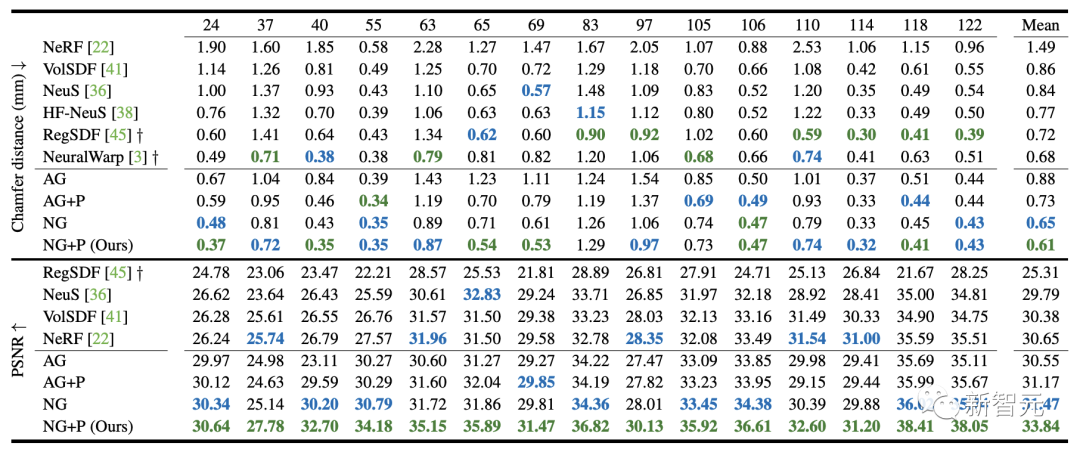
#In the qualitative comparison of different coarse-to-fine optimization schemes, when using analytical gradients AG and AG P, there are artifacts on the rough surface of the object .
When using digital gradient (NG), a better rough surface can be reconstructed and details are smoothed.
And NVIDIA’s solution (NG P) can produce smooth surfaces and fine details.

The final result is a 3D object or large object that can be used in virtual reality applications, digital twins or robotics development. scale scenario.
Nvidia said that Neuralangelo’s ability to convert the textures of complex materials, including the roughness of roof tiles and the smoothness of marble, from 2D videos into 3D objects significantly exceeds previous efforts. method.
Ming-Yu Liu, senior director of Nvidia Research and author of the paper, gave his thoughts on the significance of this research:
"Neuralangelo provides ’s 3D reconstruction capabilities will be a huge benefit to creators, helping them recreate the real world within the digital world. This tool will eventually allow developers to import detailed objects - whether they are small statues, or large buildings - into video games or industrial digital twins in a virtual environment.
Creative professionals can import these 3D objects into design applications for further editing for use in art, video game development, robotics, and Used in industrial digital twins and other fields.
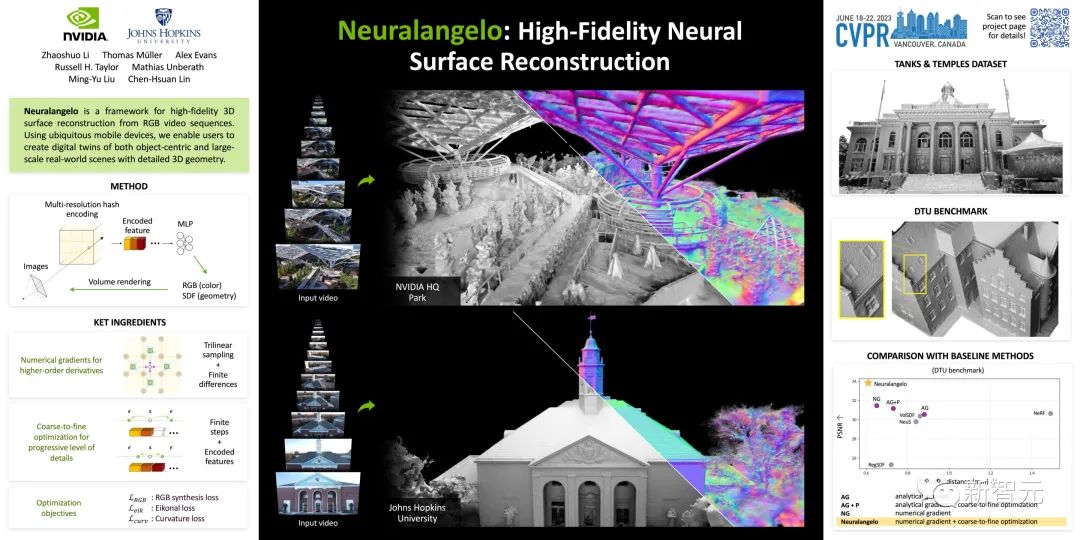
Zhaoshuo Li

Li Zhaoshuo is currently a doctoral student in computer science at Johns Hopkins University. His supervisors are Professor Mathias Unberath and Professor Russell H Taylor.
He has a strong interest in computer vision, computer graphics, and deep learning. His research focuses on reproducing motion and structure from images.
In addition, he also has many hobbies, including being a videographer, a mental health promoter, a pet dog lover, a surfer, a skydiver, a snowboarder...
Chen-Hsuan Lin

##Chen-Hsuan Lin is a research scientist at NVIDIA Research, working in computer vision, computer graphics, and artificial intelligence.
He received his PhD in Robotics from Carnegie Mellon University and was awarded an NVIDIA Graduate Fellowship. Previously, he also interned at Facebook AI Research and Adobe Research.
Lin is very interested in solving problems of 3D reconstruction, view synthesis and 3D content production. Its research aims to give artificial intelligence systems human-level 3D perception and imagination capabilities by learning from Internet-scale visual data, moving towards true 3D spatial intelligence.
Hot comments from netizensNVIDIA scientist Jim Fan said,
In order to let you understand the development of artificial intelligence in 3D modeling Speed: The field went from left (original NeRF reconstructed mesh) to right (Nvidia's Neuralangelo) in 3 years.
Transporting reality into high-fidelity simulations is no longer a dream.
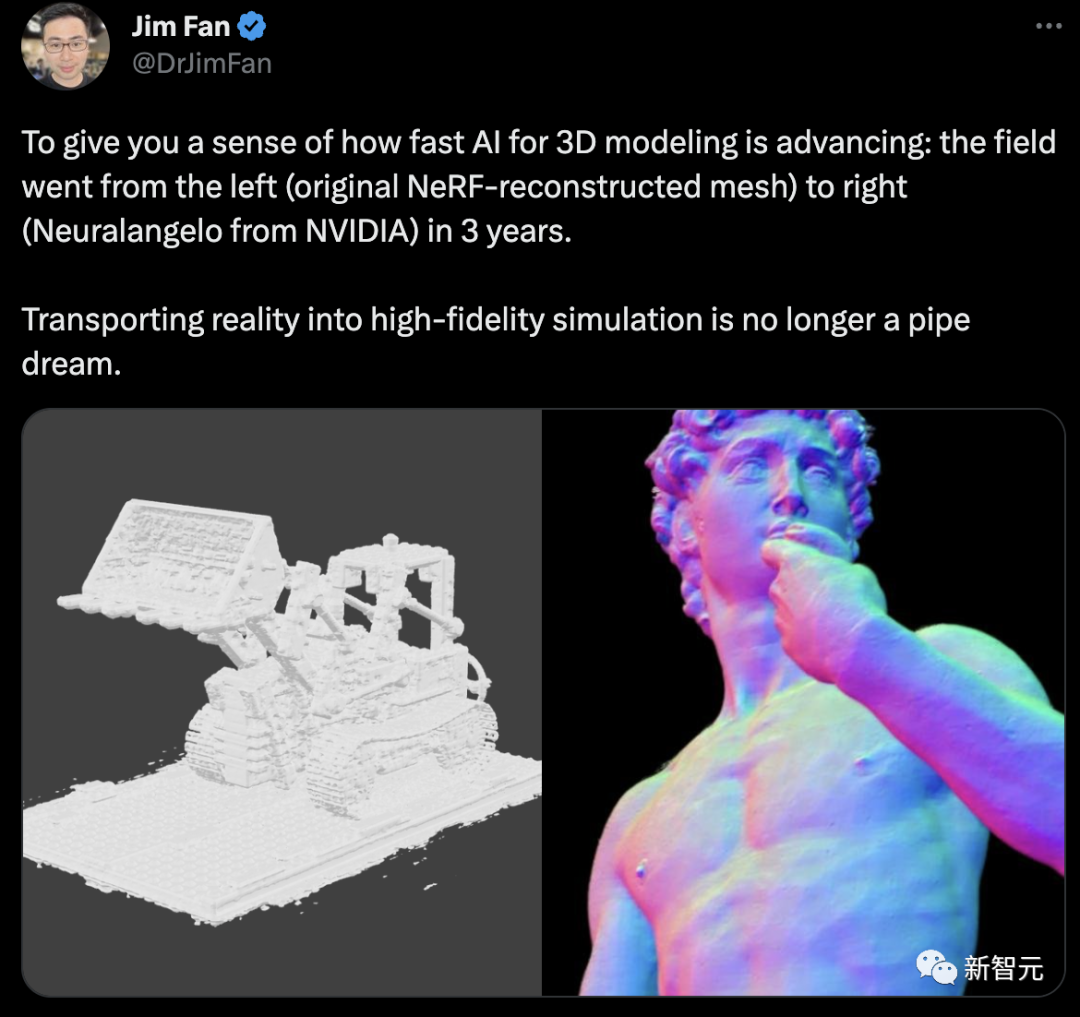
The new Neuralangelo model is a beast and Nvidia has decided to retire our, R.I.P. photogrammetry software.
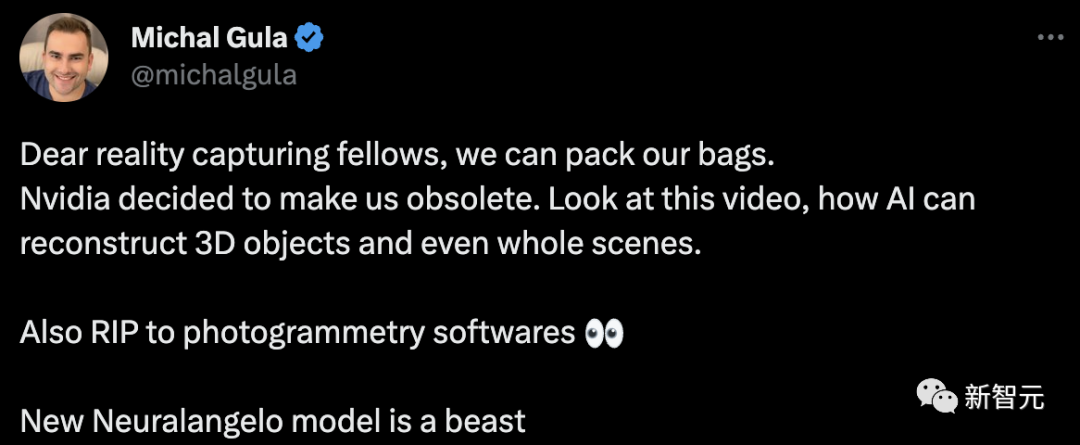
It’s like the “Michelangelo” of the digital world.

Some netizens also expressed their interest in knowing how much it costs to use?
We can use drones in factories and then send video to this model, make a digital twin, and use it to optimize our processes.

Regarding the significance of this technology, netizens believe that its impact on the gaming industry will be huge.

The above is the detailed content of David is resurrected! NVIDIA recreates 'Neural Langelo', 3D reconstructs muscle texture visible to the naked eye. For more information, please follow other related articles on the PHP Chinese website!

Hot AI Tools

Undresser.AI Undress
AI-powered app for creating realistic nude photos

AI Clothes Remover
Online AI tool for removing clothes from photos.

Undress AI Tool
Undress images for free

Clothoff.io
AI clothes remover

AI Hentai Generator
Generate AI Hentai for free.

Hot Article

Hot Tools

Notepad++7.3.1
Easy-to-use and free code editor

SublimeText3 Chinese version
Chinese version, very easy to use

Zend Studio 13.0.1
Powerful PHP integrated development environment

Dreamweaver CS6
Visual web development tools

SublimeText3 Mac version
God-level code editing software (SublimeText3)

Hot Topics
 1378
1378
 52
52
 How to implement file sorting by debian readdir
Apr 13, 2025 am 09:06 AM
How to implement file sorting by debian readdir
Apr 13, 2025 am 09:06 AM
In Debian systems, the readdir function is used to read directory contents, but the order in which it returns is not predefined. To sort files in a directory, you need to read all files first, and then sort them using the qsort function. The following code demonstrates how to sort directory files using readdir and qsort in Debian system: #include#include#include#include#include//Custom comparison function, used for qsortintcompare(constvoid*a,constvoid*b){returnstrcmp(*(
 How to set the Debian Apache log level
Apr 13, 2025 am 08:33 AM
How to set the Debian Apache log level
Apr 13, 2025 am 08:33 AM
This article describes how to adjust the logging level of the ApacheWeb server in the Debian system. By modifying the configuration file, you can control the verbose level of log information recorded by Apache. Method 1: Modify the main configuration file to locate the configuration file: The configuration file of Apache2.x is usually located in the /etc/apache2/ directory. The file name may be apache2.conf or httpd.conf, depending on your installation method. Edit configuration file: Open configuration file with root permissions using a text editor (such as nano): sudonano/etc/apache2/apache2.conf
 How to optimize the performance of debian readdir
Apr 13, 2025 am 08:48 AM
How to optimize the performance of debian readdir
Apr 13, 2025 am 08:48 AM
In Debian systems, readdir system calls are used to read directory contents. If its performance is not good, try the following optimization strategy: Simplify the number of directory files: Split large directories into multiple small directories as much as possible, reducing the number of items processed per readdir call. Enable directory content caching: build a cache mechanism, update the cache regularly or when directory content changes, and reduce frequent calls to readdir. Memory caches (such as Memcached or Redis) or local caches (such as files or databases) can be considered. Adopt efficient data structure: If you implement directory traversal by yourself, select more efficient data structures (such as hash tables instead of linear search) to store and access directory information
 Debian mail server firewall configuration tips
Apr 13, 2025 am 11:42 AM
Debian mail server firewall configuration tips
Apr 13, 2025 am 11:42 AM
Configuring a Debian mail server's firewall is an important step in ensuring server security. The following are several commonly used firewall configuration methods, including the use of iptables and firewalld. Use iptables to configure firewall to install iptables (if not already installed): sudoapt-getupdatesudoapt-getinstalliptablesView current iptables rules: sudoiptables-L configuration
 Debian mail server SSL certificate installation method
Apr 13, 2025 am 11:39 AM
Debian mail server SSL certificate installation method
Apr 13, 2025 am 11:39 AM
The steps to install an SSL certificate on the Debian mail server are as follows: 1. Install the OpenSSL toolkit First, make sure that the OpenSSL toolkit is already installed on your system. If not installed, you can use the following command to install: sudoapt-getupdatesudoapt-getinstallopenssl2. Generate private key and certificate request Next, use OpenSSL to generate a 2048-bit RSA private key and a certificate request (CSR): openss
 How debian readdir integrates with other tools
Apr 13, 2025 am 09:42 AM
How debian readdir integrates with other tools
Apr 13, 2025 am 09:42 AM
The readdir function in the Debian system is a system call used to read directory contents and is often used in C programming. This article will explain how to integrate readdir with other tools to enhance its functionality. Method 1: Combining C language program and pipeline First, write a C program to call the readdir function and output the result: #include#include#include#includeintmain(intargc,char*argv[]){DIR*dir;structdirent*entry;if(argc!=2){
 How Debian OpenSSL prevents man-in-the-middle attacks
Apr 13, 2025 am 10:30 AM
How Debian OpenSSL prevents man-in-the-middle attacks
Apr 13, 2025 am 10:30 AM
In Debian systems, OpenSSL is an important library for encryption, decryption and certificate management. To prevent a man-in-the-middle attack (MITM), the following measures can be taken: Use HTTPS: Ensure that all network requests use the HTTPS protocol instead of HTTP. HTTPS uses TLS (Transport Layer Security Protocol) to encrypt communication data to ensure that the data is not stolen or tampered during transmission. Verify server certificate: Manually verify the server certificate on the client to ensure it is trustworthy. The server can be manually verified through the delegate method of URLSession
 How to learn Debian syslog
Apr 13, 2025 am 11:51 AM
How to learn Debian syslog
Apr 13, 2025 am 11:51 AM
This guide will guide you to learn how to use Syslog in Debian systems. Syslog is a key service in Linux systems for logging system and application log messages. It helps administrators monitor and analyze system activity to quickly identify and resolve problems. 1. Basic knowledge of Syslog The core functions of Syslog include: centrally collecting and managing log messages; supporting multiple log output formats and target locations (such as files or networks); providing real-time log viewing and filtering functions. 2. Install and configure Syslog (using Rsyslog) The Debian system uses Rsyslog by default. You can install it with the following command: sudoaptupdatesud



